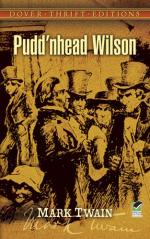For days he wandered in lonely places, thinking, thinking, thinking —trying to get his bearings. It was new work. If he met a friend, he found that the habit of a lifetime had in some mysterious way vanished —his arm hung limp, instead of involuntarily extending the hand for a shake. It was the “nigger” in him asserting its humility, and he blushed and was abashed. And the “nigger” in him was surprised when the white friend put out his hand for a shake with him. He found the “nigger” in him involuntarily giving the road, on the sidewalk, to a white rowdy and loafer. When Rowena, the dearest thing his heart knew, the idol of his secret worship, invited him in, the “nigger” in him made an embarrassed excuse and was afraid to enter and sit with the dread white folks on equal terms. The “nigger” in him went shrinking and skulking here and there and yonder, and fancying it saw suspicion and maybe detection in all faces, tones, and gestures. So strange and uncharacteristic was Tom’s conduct that people noticed it, and turned to look after him when he passed on; and when he glanced back—as he could not help doing, in spite of his best resistance—and caught that puzzled expression in a person’s face, it gave him a sick feeling, and he took himself out of view as quickly as he could. He presently came to have a hunted sense and a hunted look, and then he fled away to the hilltops and the solitudes. He said to himself that the curse of Ham was upon him.
He dreaded his meals; the “nigger” in him was ashamed to sit at the white folk’s table, and feared discovery all the time; and once when Judge Driscoll said, “What’s the matter with you? You look as meek as a nigger,” he felt as secret murderers are said to feel when the accuser says, “Thou art the man!” Tom said he was not well, and left the table.
His ostensible “aunt’s” solicitudes and endearments were become a terror to him, and he avoided them.
And all the time, hatred of his ostensible “uncle” was steadily growing in his heart; for he said to himself, “He is white; and I am his chattel, his property, his goods, and he can sell me, just as he could his dog.”
For as much as a week after this, Tom imagined that his character had undergone a pretty radical change. But that was because he did not know himself.
In several ways his opinions were totally changed, and would never go back to what they were before, but the main structure of his character was not changed, and could not be changed. One or two very important features of it were altered, and in time effects would result from this, if opportunity offered—effects of a quite serious nature, too. Under the influence of a great mental and moral upheaval, his character and his habits had taken on the appearance of complete change, but after a while with the subsidence of the storm, both began to settle toward their former places. He dropped gradually back into his old frivolous and easygoing ways and conditions of feeling and manner of speech, and no familiar of his could have detected anything in him that differentiated him from the weak and careless Tom of other days.




